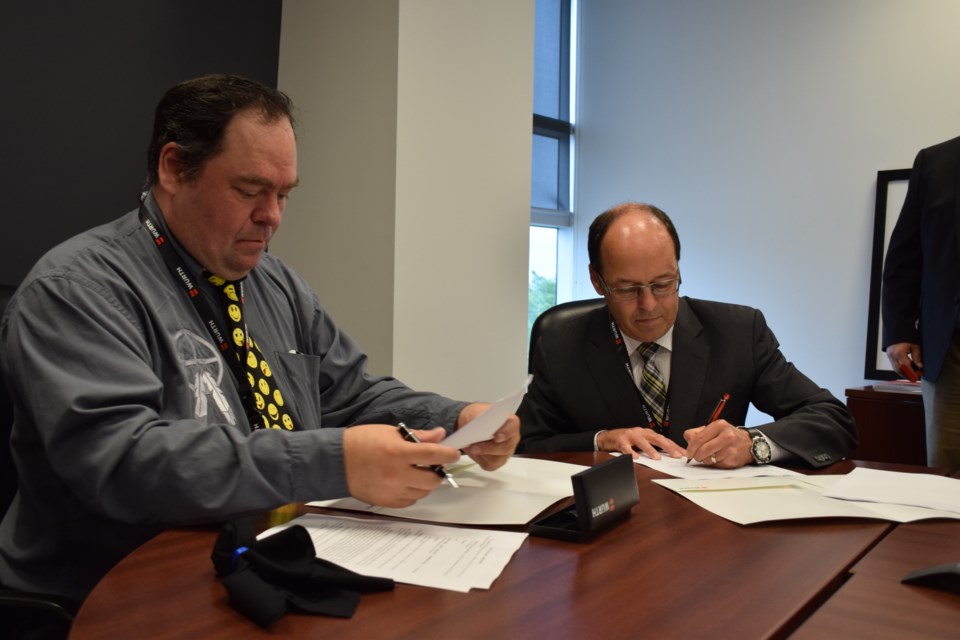Würth Canada, headquartered in Guelph, has signed an important agreement with the northern Ontario community of Missanabie Cree First Nation.
The First Nation, with traditional lands located about 400 kilometers north of Sault Ste. Marie, has agreements with two private mining companies with operations on those lands.
Chief Jason Gauthier said during an agreement signing event Thursday at Würth’s 345 Hanlon Creek Boulevard location, that the First Nation has agreements to provide services and personnel on some aspects of those mining operations. To meet those obligations, Missanabie Cree has partnered with Würth as a supplier.
The signing included a prayer of thanksgiving, and a gift of tobacco to the Indigenous visitors.
Würth is an international company with 70,000 employees worldwide. In 2013, the company had $14 billion in sales. Its Canadian arm was founded in 1971. The company supplies a wide range of products for the automotive, trucking, and industrial sectors, including tools, electrical wiring components, chemicals, fasteners, and abrasives.
The agreement between Würth and Missanabie Cree First Nation, officials said, is about more than mutual economic benefit. It is also rooted in shared values, Würth Canada CEO and president Ernie Sweeney said. Among those are honesty, fairness and mutual respect, he said. He added that the partnership is expected to be a growing one. Missanabie Cree conducted careful research on Würth and liked what it saw, Gauthier indicated.
Gauthier said Indigenous Peoples have thousands of years of history in the Missanabie territory, and hold the land and its occupancy dearly. The First Nation, he added, is an ambitious and creative one that is undertaking and exploring many different types of initiatives.
In an interview, Gauthier said his community has signed a pair of community benefit agreements with mining companies in the traditional territories, one with Richmont Mines’ Island Gold Mine, the other with Argonaut Gold’s Magino gold project.
“These large companies are both looking for certain services and products, and part of our agreement was to have Missanabie Cree as part of the joint ventures with them and relationships with the companies which they deal with,” Gauthier said. “There has really been a reach out to different companies for us to work with in our relationship to those mining companies.”
Würth, he said, can provided the need products and services the First Nation needs to fulfill its agreements with the mining companies, he added.
“This is based on a one-stop shop,” Sweeney added. “We want to work as a true partnership with the Missanabie Cree business community, to also utilize their resources. We will be basically recruiting Missanabie Cree to help us manage the stock at their location.”
He added that Würth sees significant potential to replicate similar agreements with other First Nations across the country in the future, a possibility that has been discussed with Missanabie Cree.
Richmont Mines is currently undertaking an extensive development on its Island Gold Mine in the territory to reach a deeper gold resource. Sweeney foresees the need to multiply Würth’s resources to satisfy the needs of the northern mine operations.
“We will multiply as needed, and will have totally open communication with full honesty and integrity,” he said.
Würth Canada will hire Missanabie Cree employees to provide critical insights and to manage the First Nation’s account, and Würth employees will receive cultural training to better understand their new partners.
